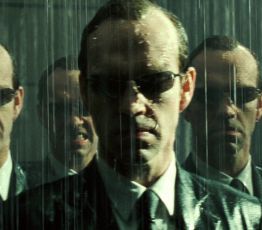Holy week does not have to be an excrutiating week spent on mind-dulling Catholic ritual and mindless beach partying. There is lots of home entertainment available that can contribute to enriching one’s spiritual framework far more efficiently and profoundly than the traditional listening to a bunch of men in robes or gyrating to loud throbbing music.
Here are my top picks of spiritually enlightening Hollywood products.
* * *
| SUPPORT INDEPENDENT SOCIAL COMMENTARY! Subscribe to our Substack community GRP Insider to receive by email our in-depth free weekly newsletter. Opt into a paid subscription and you'll get premium insider briefs and insights from us. Subscribe to our Substack newsletter, GRP Insider! Learn more |
The Matrix

The film builds upon the notion that we experience “reality” only through an internal model of the world we build within our minds on the basis of data collected by our five senses and processed by our brains. We do not, for example, directly “see” the photons our eyes collect. What is really happening is that we perceive a construct rendered for “us” by our minds after it had processed data sent to it by our eyes which, for their part, had been generated from the photons hitting their retinas.
The image of the world around us — its colours and shapes — are really internal models built from streams of data sent to our brains based on the manner with which light is reflected from objects around us. Bats most likely “see” their surroundings in a similar way we do too — but it is a visualisation based not on light but on sound bouncing off objects around them. Different wave or energy forms, same principle. We use light to “see”, bats use sound to “see”. In a sense, the nature of the external stimulus (i.e. whether it is electromagnetic — light — or rapid periodic compression — sound) is ultimately irrelevant to “us”. Ultimately it all comes down to a data stream entering our brains.
This is the fundamental principle of the tech field of virtual reality where data generated by computers aim to replace data generated by our senses. Progressively bigger screens and higher resolutions make first-person game playing, for example, an increasingly absorbing experience because the density of data being fed to us and the scope of our awareness captured by the data feed respectively keeps improving. Google recently announced “Project Glass” a concept product that places a computing device screen on a pair of glasses (like the heads-up display on fighter planes).
The see-through lens could display everything from text messages to maps to reminders. They may be capable of showing video chats, providing turn-by-turn directions, taking photos and recording notes — all through simple voice commands…
Such a product, when released, will just about complete the physical takeover of our visual scope and make our interface with our computing devices one step closer to full integration into our minute-by-minute personal experience of our typical day.
The concept of the Matrix from which Larry and Andy Wachowski’s seminal film derives its title, however, is the ultimate virtual reality. Unlike Google’s glasses, the Matrix’s data feed bypasses our senses and is input straight into the neural network of people’s brains. As far as the hapless souls who perceive the world processed from the data fed straight into their brains, they are “experiencing” what is “real”.
So the question is:
Are we experiencing reality? Or are we simply living within an elaborate computer simulation?
We will not ever know of course. At least not until we have concluded the “experience”.
Inception

It takes a monumental effort to take a conscious step outside of the elaborate belief system that scaffolds our sense of self. Perhaps this is because our personal identities like a vine while having grown tall and wide over our lifetimes will simply collapse into a shapeless pile if said scaffolding disappears. Who are we, say, if the concept of being “Filipino” were to disappear tomorrow? What is life’s meaning if the “meaning” spoonfed to us by Roman Catholicism is suddenly yanked from under our feet the next minute?
In the film, Dom Cobb (played by Leonardo DiCaprio) could only watch helplessly as his wife Mallorie Cobb (played by Marion Cotillard) descends into a pathological obssessive skepticism about what she perceives to be real, thinking that she still remains twice removed from it in a dream state even when (according to the plot) she had already ascended to the final waking state.
The story highlights the power of seeding a human mind and watching it develop around that seed as well as the astounding sheer will and conviction required to re-evaluate the very essence of the mind we had constructed around it later on in the face of new input.
What are the seeds around which our minds are wrapped?
Knowing these, do we have the strength of character and substantial enough conviction to unwrap our minds from these and regard them critically? It seems that uncovering life’s true meaning involves re-examining the seeds of the belief systems that had traditionally defined that meaning for us.
The Adjustment Bureau

George Nolfi’s take on who and/or what may be aware of “the bigger picture” and may be executing some sort of grand “plan” on its basis delivers! In essence, the film dramatises a humanised take on religion and its henchmen. The film delves quite a bit into painting an elaborate picture on how this “big picture” is documented, what sort of organisation executes “the plan” surrounding it, and developing an emerging sense of the pointlessness of exercising free will in the face of the bureacratic power that seeks to quell it as the story unfolds.
Being the American film that it is, the ending is predictably happy and hopeful in favour of human will. But that happy twist is paid for by a clear lesson on the courage and conviction required to win back and sustain said will.
Do we possess the courage and conviction to take control of our destinies?
This is an obvious question but a difficult one to answer as said answer is necessarily built upon the lessons offered in the first two films.
* * *
Watch and reflect. The Easter holidays need not be one where you need to be imprisoned in tradition.
Happy Holy Week!
benign0 is the Webmaster of GetRealPhilippines.com.
“Who are we, say, if the concept of being “Filipino†were to disappear tomorrow?”
American?
Great article. Stimulating for the brain. Stretched it out a bit.
Man, the questions posed by the exposition of topics such as these should be the daily bread of Filipinos.
Too bad most of us are too lazy to use our minds and instead revert to simplistic generalizations of things.
More power to Benigno and the gang. Please do write more of these stuff, it’s a anti-loneliness pill in a society steeped in simplistic and authoritarian reasoning.
oops, wrong post, this was supposed to be on the general comments section
BenignO
There is, of course, the “spiritual†concept of “reincarnation‖of having lived through several “destinies†in the past–which also accounts for a number of movies (and TV shows) produced along this theme.
I can’t recall them off the top of my head but I am sure I’ve seen them. What you mentioned, however, reminds me of a British TV series called Sapphire and Steel which I used to follow when I was little which starred David McCallum and Joanna Lumley who both played some sort of aliens who traveled from one dimension to another at will…
The Twilight Zone series in B&W TV in the mid-1960s produced by Rod Serling (and the show’s narrator) was one favorite TV show of my generation, and I can still remember very well The Hitch Hiker episode.
Benigs, while reading this I was thinking of the movie “The Dark Knight”. For me, it raises an idea related to “spirituality”:
How do you deal with an enemy/opponent who plays by no rules? Do you have to become a dragon in order to fight one?
Superb question. The US deals with this in fighting terrorists who seem to have no civilized rules, putting civilians in the crosshairs. Whereas the US is hamstrung by civilized rules that ban torture of suspects.
The answer is that you get some really good drones with some really deadly hardware.
Or you make a top-secret special forces team that operates by no rules either.
Plausible deniability, and the power to disavow any knowledge of such clandestine operations.
I remember reading somewhere though, that the US government is incredibly poor at keeping secrets, that it leaks like a sieve.
It Wikileaks like a sieve. But privacy is an archaic idea anyhow in this day of the minicam and trackers and social network sharing. Might as well get used to living in the nude.
If there was ever anything that Old Europe ever did right (and what the US does wrong a lot of times), was to keep everything secret what is supposed to be secret. The British release their secrets in so very low-key a manner that people just don’t get interested. Amrikani however make a big deal out of everything and thanks to the blow-up, stuff gets mishandled for political expediency and objectives are achieved lousily.
Nietzsche’s ideas come to mind.
“Battle not with monsters, lest ye become a monster, and if you gaze into the abyss, the abyss gazes also into you.”
I wonder if Neitzsche had dear ones killed by religious terrorists. If so he is amazingly cold. If not he is irrelevant.
Oh, no. My reply was supposed to address Fallen’s remark on The Dark Knight, specifically about Batman’s dilemma.
“How do you deal with an enemy/opponent who plays by no rules? Do you have to become a dragon in order to fight one?”
Mine was supposed to address Neitzsche’s view on the matter. I think it was profound but unrealistic.
Oh man. I guess we’re on different boats then. Sorry about that. XD
@Joe
Sorry for interrupting, but I guess Nietzsche meant the passage to those that are introspective enough to transcend emotions and conventions, sort of the uber mensch types. But yeah, its quite unrealistic.
Ahh, Friedrich Nietzsche, considered by some to be the “bad guy” of philosophy.
I have yet to read extensively his work; from what I gather, Also sprach Zarathustra (Thus spoke Zarathustra) is one of his more notable ones.
I guess the reason for that is Nietzsche’s philosophy is quite ambiguous enough to warrant extreme interpretation from the readers. Note that most of his so-called “followers” went on to became Nazis.
I think his philosophy is a reaction to dogmatism on one hand, and sophism on the other. In essence, his view is that reasoning requires a great degree of prudence; not clinging to the extremes. His views are more in line with Taoism’s take on exercising flexibility in decisions vis a vis the circumstances and variables involved.
btw, I think Beyond Good and Evil is a better read (in terms of substance) than Also sprach, although the latter is more dramatic and engaging.
I think Joe cited a good example in the West’s battle with terrorists. But closer to home, I think we deal with pretty much the same thing when we “debate” using (to the best of our faculties) logical constructs with people who apply nothing more than recycled notions and parroted platitudes in the assertions they make.
Then again, maybe it is true that those who play by the rules lose out to those who don’t in the long run — much the same way Rome eventually succumbed to the barbarian hordes that nipped continuously at their frontiers and the way the West and affluent Northeast Asian countries like Japan are today beset by ageing and declining populations, soon to be outnumbered by the more “reproductive” people of the Third World.
It is a tough reality indeed; to either adapt, or face extinction. The concepts of morality and righteousness suddenly take a back seat when your very survival is threatened.
Sometimes men must resort to the only language other men are capable of understanding: violence. Especially when all efforts at diplomacy have been exhausted and failed.
hi Benigno,
You may add the movie Hero starring Jet Li to the list. It’s an interesting (quite controversial) take on authoritarianism and centralization. But it’ll probably ruin the message of the article if it was included, though. Anyway, it’s a good watch especially if you’re a wu xia fan.